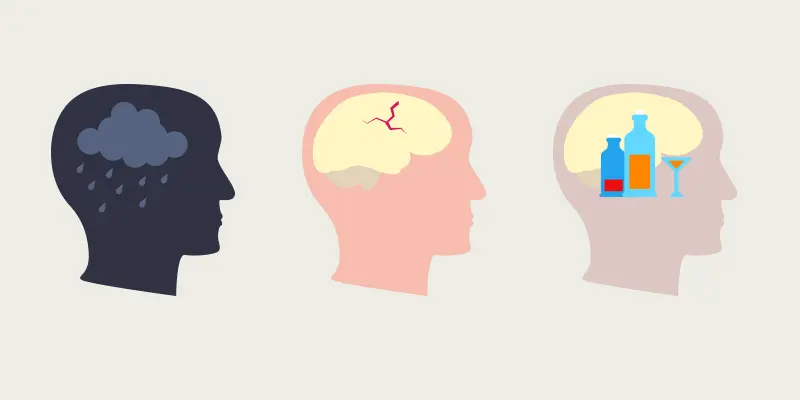
If you want to preserve your memory and avoid Alzheimer’s disease and other dementias, you need to avoid the common risk factors associated with cognitive dysfunction. Health experts have identified 3 new modifiable risk factors for dementia, according to the 2020 report of the Lancet Commission. These new factors that contribute to increased risk of memory loss and cognitive dysfunction join 9 other risk factors previously identified by the Lancet Commission.
The 9 previously identified risk factors are:
- Depression
- Less education
- Hypertension
- Hearing impairment
- Smoking
- Obesity
- Physical inactivity
- Diabetes
- Low social contact
The 3 new modifiable risk factors are:
- Traumatic brain injury
- Excessive alcohol consumption
- Air pollution
According to the commission, these 12 risk factors account for approximately 40% of dementias worldwide. The expert panel suggests that preventing or treating these risk factors could potentially delay or avoid dementias, including the most common form, Alzheimer’s disease.
Health experts have identified 3 new modifiable risk factors for dementia: traumatic brain injury, excessive alcohol consumption, and air pollution. Click To TweetWHAT BRAIN IMAGING REVEALS ABOUT THE NEW RISK FACTORS FOR MEMORY LOSS
At Amen Clinics, which has built the world’s largest database of functional brain scans (over 160,000 and growing), brain SPECT imaging shows how these new risk factors impact memory and cognitive function.
- Traumatic brain injury (TBI): At Amen Clinics, which has scanned tens of thousands of patients in over 30 years of clinical practice, SPECT imaging reveals that approximately 40% of those patients have an undetected brain injury. With brain imaging, it has become clear that TBIs are a major cause of psychiatric and cognitive problems, but few people know it because traditional psychiatrists never look at the brain. Preventing further head injuries and taking steps to heal the brain can reduce your risk.
- Excessive alcohol consumption: The brain imaging work at Amen Clinics has identified 5 scary ways alcohol damages the brain, including shrinking brain volume and causing atrophy in the brain’s memory centers. These issues are known to contribute to future memory problems and Alzheimer’s disease.
- Air pollution: Environmental toxins, such as air pollution, can harm the brain and contribute to psychiatric or cognitive issues. On SPECT scans, “toxic brains” have a scalloped appearance with overall decreased blood flow.
Although the Lancet Commission only recently recognized TBIs, heavy alcohol use, and air pollution as contributing factors for dementia, Amen Clinics had already linked these risks to memory problems years earlier. In fact, Amen Clinics has identified the 11 major risk factors that steal your mind and increase the likelihood of memory problems and Alzheimer’s disease. The mnemonic (memory device) BRIGHT MINDS makes it easy to remember them.
THE 11 BRIGHT MINDS RISK FACTORS
B is for blood flow: Problems such as high blood pressure, heart disease, and lack of exercise reduce blood flow to the brain. On SPECT, low blood flow is the # predictor of Alzheimer’s disease.
R is for retirement and aging: When you stop learning, your brain starts dying. Less education growing up and no new learning in your adult life are bad for your brain.
I is for inflammation: Chronic inflammation is like an internal fire that destroys your mind.
G is for genetics: A family history of dementia increases your risk, but it is not a death sentence. Think of it as a wake-up call to get serious about your brain health.
H is for head trauma: As you saw above, head injuries, such as concussions, are a silent epidemic that impacts memory.
T is for toxins: Exposure to environmental toxins—household cleaning supplies, pesticides, air pollution, alcohol, drugs, and others—can damage the brain and contribute to cognitive dysfunction.
M is for mental health: Studies have shown that depression, which the Lancet Commission recognized as a risk factor for dementia, is not the only psychiatric condition associated with memory problems. Bipolar disorder, schizophrenia, post-traumatic stress disorder (PTSD), ADD/ADHD, and chronic stress also significantly increase the risk of memory problems.
I is for immunity and infections: Chronic issues, such as autoimmune disorders and infections like Lyme disease, commonly impact memory and contribute to brain fog.
N is for neurohormones: Hormonal imbalances, such as thyroid issues, are associated with cognitive impairment and memory problems.
D is for diabesity: Having diabetes and/or being obese increases the risk of Alzheimer’s disease. Research in The New England Journal of Medicine shows that even mildly elevated blood sugar levels and pre-diabetes are a significant problem and associated with brain atrophy, memory problems and dementia.
S is for sleep: A number of studies, including a 2011 study in JAMA, link sleep problems, such as insomnia and sleep apnea, to a higher risk of memory problems and dementia, but findings in the journal Neurology show that effectively treating these disorders can have a positive impact on memory and brain function.
The best way to sharpen your memory, reverse brain aging, and prevent memory loss and Alzheimer’s disease is to eliminate, prevent, or treat all the BRIGHT MINDS risk factors.
At Amen Clinics, our Memory Rescue BRIGHT MINDS Program offers a comprehensive approach to memory loss and dementia. In addition to brain SPECT imaging to identify any underlying hidden brain injuries, we also look at the biological, psychological, social, and spiritual factors in your life that may be contributing to memory problems.
We are available for in-clinic brain scanning and appointments, as well as mental telehealth, remote clinical evaluations, and video therapy. Find out more by speaking to a specialist today at 888-288-9834 or visit our contact page here.





Many thanks to Dr Amen ,this information guides us on the road to life ,the road of life is very winding and bumpy ,and you and your spouse inform all of us with compassion ,thank you so much for all this clear kindness
Comment by Sholeh — January 15, 2021 @ 5:48 AM
I agree with all of the risk factors that you mentioned. I would like to add one more risk factor to it. We need to stimulate our brain and learn something new every day. By doing this, we use more neurons. I personally have had PASSION for KNOWLEDGE since I was 4 years old. Thank you very much. Happy New Year to all of you again and have a wonderful day and enjoy your life. Dr. Marie Blair.
Comment by Marie Blair, M.D. — January 15, 2021 @ 6:38 AM
Thanks for sharing and enjoy the articles. Tim.
Comment by Timothy Lee — January 15, 2021 @ 7:05 AM
SMOKING and AIR POLLUTION
What types and frequencies of smoking ? (Since almost all of us indulge or are exposed to both.)
For example:
Vaping?
Weed smoking?
What about THC ingested orally?
What about nicotine ingested via the gums?
Comment by Valerie Mehlig Curry — January 15, 2021 @ 7:16 AM
What’s your location?
Comment by PaulaMorris — January 15, 2021 @ 7:42 AM
Amen Clinics’ articles are just always instructive, smart and positive. Thank you!
Comment by Roberto Lopes — January 15, 2021 @ 11:22 AM
I have a question about chronic pain being one of the causes of memory loss and dementia. For 23 years I suffered chronic pain due to misdiagnosed broken back and nerve damage that occurred and during that time noticed my memory loss happening along with mood disorders. Havin g been on the other side now I can say it is much better and so is my retention, and general mental health.
Comment by Cynthia Culp — January 15, 2021 @ 11:59 AM
I’m now ready for this
Comment by Tammy dwyer — January 15, 2021 @ 3:26 PM
Are brain surgeries a form of TBI? I had surgery for a vascular mass in the posterior fossa and then for a CSF leak that developed post surgery.
Comment by Lonna Johnson — January 15, 2021 @ 4:57 PM
I have suffered 2 bouts of major depression and have been on anti-depressant medication for many years.
It’s unlikely that I will ever come off the medication. I am physically active, don’t smoke and drink moderately . Though retired I try to maintain a busy life through various volunteer activities.
Does above make me a candidate for dementia?
Comment by David — January 15, 2021 @ 8:40 PM
I am most interested in learning more about risk factors for memory loss & the 11 Bright minds risk factors.
Comment by Marvin Negrin — January 16, 2021 @ 12:40 PM
Thanks for bringing this much needed information to us.
Comment by Cathy Wentzel — January 16, 2021 @ 1:18 PM
Dr. Amen, I really appreciate all the information you posted, All of us need to know about the pros and cons of our Lifestyle in this day & age, the influences of our environment and products we’re using & are around us, I like to include the harmful side-effects of chemicals and products used these days don’t help our bodies, as well as the negative affects of toxicity, in our world don’t help, Let’s use more natural ways to clean and sterilise our life and lifestyle, Starting with clean & organic foods, Alkaline water, diet and exercise, Learning and growing, to stimulate Our bodies mines & spirit, because all of it is connected, everything is affected, physically, mentally & spiritually, let’s eat, live Clean & healthy, thank you for the education, Contribution And the knowledge you sharing with all of us, your a blessing to All of us, I respectfully Dr. Rimon Naji, Christian psychologist, nutritionist & life coach,
Comment by Dr. Rimon Naji — January 26, 2021 @ 5:53 AM